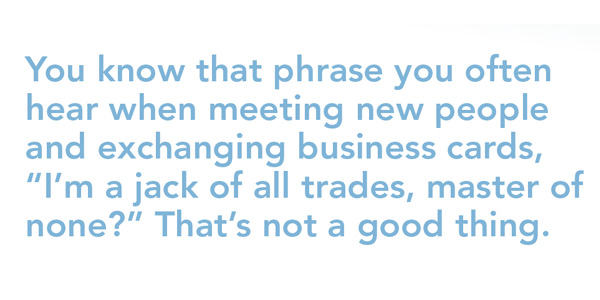
It’s in every American’s blood to achieve more, do better, strive. (Well, most Americans. Everyone has that one cousin who doesn’t do a whole lot.)
But in this hyper-aware, hyper-competitive world in which we live, I’d like everyone to do one, huge thing: less.
Of everything.
What? Yes, that’s right, less.
You know that phrase you often hear when meeting new people and exchanging business cards, “I’m a jack of all trades, master of none?” That’s not a good thing. And I’m not sure why we hear it so much. I think it’s meant as a badge of honor. Or maybe it’s meant to be a sign of humility. But that person needs to listen to his or her own words and act on them.
I don’t care how big your business is. Everyone is trying to do too much, be too much to too many other people and businesses.

The signs are everywhere: Too few employees trying to do more and more complex tasks; companies offering myriad services, many of which seem impossible to accomplish them all well; half-completed projects; people chasing their tails, going after the shiny new ball of aluminum foil.
What’s the result? Are your sales down? Do you feel like you’ve thrown everything you can at the wall and nothing is sticking? If so, I’m pretty sure it’s not the market: It’s you.
Stop it. Stop trying to be everything, and watch your sales improve.
Let’s get back to our customers and give them what they want and need. What’s the best way to do that? Listen to them. It isn’t any harder than that.
The future is not in a web page, an app or an algorithm. Success is rooted in connecting with people, discovering their needs and providing them the products and services they need to do their business.
It’s as simple as that.






